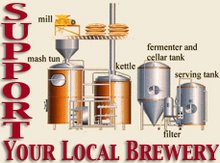Flounder Brewing's upcoming first batch
Just two days past their first anniversary of becoming an official craft brewery in New Jersey, Flounder Brewing will fire up the kettle for the Somerset County brewery's first commercial batch of beer, a brew day that's been a long time coming, and one that has traveled a somewhat circuitous path.
Making the batch of Hill Street Honey Ale (5% ABV, 25 IBUs) is on the calendar for March 9 at the 1-barrel brewery in Hillsborough. The ale's a time-tested recipe from the Flounder guys' days as homebrewers in Lyndhurst, one they hope to follow up with Murky Brown Ale and a pumpkin ale in the fall. The Hill Street ale is made with orange blossom honey and fermented with East Coast Yeast's Old Newark Ale strain, a progeny of the strain used to make Ballantine ale. Flounder Brewing is a partnership of Jeremy Lees, his brothers, Mike and Dan; brother-in-law Greg Banacki Jr.; and cousin William Jordan V.
A pallet of 2,000 bottles is due to arrive late next week at the brewery located in a business park (yes, even at its small size, the brewery plans to bottle using a counter-pressure filler more likely to be found filling growlers in some brewpubs like Iron Hill); there's some big warehouse racking inside the brewery, stocked with T-shirts and pint glasses; growlers are on order, and a soft opening is planned for around mid-spring.
The Fox & Hound Tavern in Lebanon (Hunterdon County) is a likely candidate for a first bar draft account. Morris Tap and Grill in Randolph (Morris County) is also on the draft-account target list. But it's tasting room sales that will play a substantial role in the brewery's business plans, especially now that a change in state law last fall eased restrictions on retailing both packaged beer and beer by the pint to people who stop by for tours.
"We're going to be careful that we're not a taproom," says Jeremy, the Flounder in the brewery's name (yes, that's Jeremy's nickname, à la Animal House). "We will be serving pints to people who want to buy a pint. There are going to be limits, because we're small.
 |
| Jeremy 'Flounder' Lees in tasting room |
Unofficially, the March 9 brew will be the third by Flounder Brewing. The brewery did two pilot batches at half volume last fall and early winter to work out mechanical bugs in the brewing system – it turns out the kettle had a leak – and to gauge how the honey ale recipe fared on a new brewing setup.
After a year as a licensed entity, to say that Flounder is finally making beer commercially may be accurate. But it's also a little too predicated on the idea that time is money.
State regulators indeed licensed Flounder Brewing on March 7, 2012. But the Flounder guys never considered their licensing to be a starter-pistol shot. Back then, there were still some odds and ends to deal with to finish out the brewery before striking an mash. There was no race to have beer for sale before the ink was dry and the license was framed and hung on a wall.
As a business, Flounder Brewing was founded with a mindset that homebrewer enthusiasm could spill over into a commercial enterprise in an individualized fashion, writing your own script, holding onto the day jobs that pay the bills and not disrupting family lives.
"The brewery was never set out to be, at the get-go, drop everything and it's your job now" says Jeremy. "It was always turning our hobby into the brewery. Without a doubt, one day I would love to be running a brewery and brewing beer, and that's my day job. But our business plan wasn't, 'All right, in the first two years we can all quit our jobs because we're pulling in this income.'
"We have flexibility, because really our only overhead is the rent we pay and our yearly licensing."
Nonetheless, Flounder Brewing experienced a delay, and it had some very specific reasons, for which the go-slow approach proved beneficial: Jeremy and his wife Melissa's twins, Lyla and Ethan, decided to show up a little early, as in premature. As such, the twins' extended hospital stay and subsequent getting settled at home meant the brewery business would have to slip to a lower priority.
"It was a life-changing event. There was a lot of shifting around, but that was also the intention of starting the way we were starting, at the size we were starting, to give us the flexibility without having our houses on the line, or whatnot, for when things do come up or get twisted or turned around," Jeremy says. "We'd planned to have children, but didn't expect it to be two, and the complications that were there, too, kind of just pushed it.
"That's when we found ourselves all of a sudden we're heading into another winter ... here we are again, it's another season, and here we are coming up to the license (anniversary)."
And now the upcoming brew day.
Of course, getting to that point – getting back on track – involved finishing out the brewhouse area. The pace was again slow, tethered to a pay-as-you-go imperative for piping the brewery. Brewing fittings aren't cheap. When your personal wallet's involved, there's no rushing.
"When I was doing the hardware on the system, I did it all on the stainless tri clover piping everywhere. It's a pretty penny for that kind of stuff," Jeremy says. "I had to do it in two phases, because I had to do it with money from paychecks. It had to be done over phases. We did it. Even though it's just 1 barrel, it's a homebrewer's dream of a system now."
And now a group dream unfolding to a reality: selling the public beer that has its roots in a homebrew kettle in Lyndhurst eight years ago, with the Flounder folks celebrating their home-made beer as an experience around the barbecue pit and camaraderie.
"We got into this game to just have a good time and enjoy what we're doing. That's what we've been doing," Jeremy says.
They hope New Jersey's craft beer enthusiasts will soon get to experience the beer, too.















2 comments:
When will the brewery be up and running for patrons from the area begin coming to purchase pints?
@FranSando ... Give the brewery and Flounder folks a shout. I'm sure they'd love to hear people are interesting in their impending brew.
But, generally speaking, it's a two-week turnaround time for ales. You can roughly gauge by that from the date of the brew.
However, again, the best advice would come from the Flounder folks.
Cheers.
Post a Comment